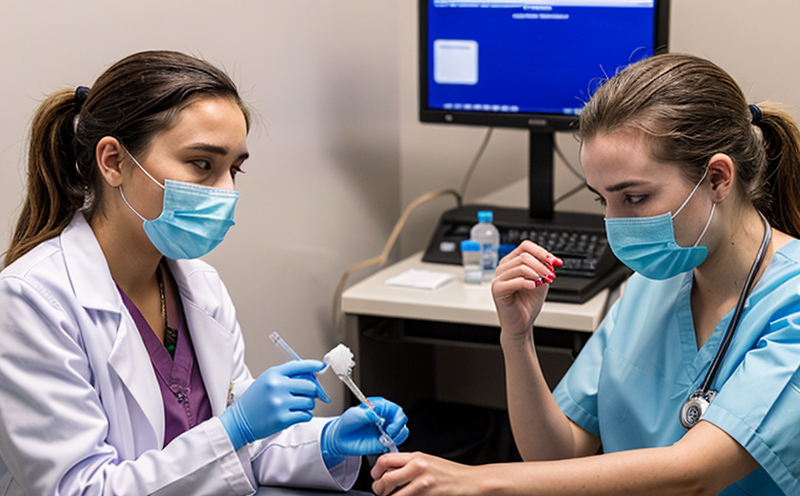CDC C. difficile Detection in Clinical Microbiology
The detection of Clostridioides difficile (formerly known as Clostridium difficile) is a critical aspect of clinical microbiology, particularly important for the diagnosis and management of patients with suspected Clostridioides difficile infection (CDI). CDI can lead to severe gastrointestinal symptoms including diarrhea, which may progress to pseudomembranous colitis in more serious cases. The Centers for Disease Control and Prevention (CDC) recommends that laboratories adopt a multi-step approach to the detection of Clostridioides difficile toxin and its associated ribotypes.
The most common method used today is enzyme immunoassay (EIA) testing, which detects toxins A or B produced by the bacterium. However, this method has limitations; it cannot differentiate between toxigenic strains of Clostridioides difficile and non-toxigenic strains. To address these limitations, the CDC recommends a two-step approach for CDI diagnosis:
- Toxin detection by enzyme immunoassay (EIA): This initial step helps to screen samples for the presence of Clostridioides difficile toxins A or B.
- Confirmation using culture and ribotype analysis: If EIA is positive, further testing should be conducted to confirm toxigenic strain identification. This includes culture-based methods followed by molecular techniques like PCR for determining the specific ribotypes of Clostridioides difficile.
The CDC guidelines emphasize that accurate and timely detection of Clostridioides difficile is essential to prevent unnecessary antibiotic use, reduce transmission within healthcare settings, and improve patient outcomes. Proper identification helps clinicians make informed decisions about treatment strategies such as administering appropriate antibiotics or probiotics.
Eurofins Clinical Testing, with its advanced laboratory facilities and experienced microbiologists, offers a comprehensive service for CDC C. difficile detection in clinical microbiology, ensuring that laboratories adhere to the most stringent international standards including those set by ISO 15189:2012. Our state-of-the-art equipment and rigorous quality assurance processes guarantee reliable results.
Our services include:
- Enzyme immunoassay (EIA) for the detection of toxins A or B produced by Clostridioides difficile.
- Culture-based methods to isolate and identify toxigenic strains of Clostridioides difficile.
- Molecular testing using PCR techniques to determine specific ribotypes.
- Comprehensive reporting aligned with CDC recommendations for accurate diagnosis and management of CDI cases.
The importance of this service cannot be overstated, especially in healthcare settings where the transmission rates are high. By offering robust detection methods that comply with CDC guidelines, Eurofins Clinical Testing supports public health goals aimed at reducing the incidence of CDI and ensuring patient safety.
In summary, our CDC C. difficile detection service provides laboratories with reliable tools to meet the stringent requirements set by the CDC. This ensures accurate diagnosis and effective management of Clostridioides difficile infections, contributing significantly to improved healthcare outcomes.
Eurolab Advantages
At Eurofins Clinical Testing, we pride ourselves on providing exceptional services that go beyond mere compliance. Our expertise lies in delivering accurate, timely, and actionable insights into the presence of Clostridioides difficile. Here are some key advantages:
- State-of-the-Art Facilities: Equipped with cutting-edge technology that ensures precise results.
- Experienced Staff: Our team of microbiologists and technicians is highly trained in the latest techniques for Clostridioides difficile detection.
- Comprehensive Reporting: Detailed reports aligned with CDC guidelines, supporting informed decision-making by healthcare professionals.
- ISO 15189:2012 Compliance: Adherence to international standards for quality assurance and competence in medical laboratories.
- Timely Turnaround Times: Efficient processes ensure that results are delivered promptly, facilitating quicker interventions if necessary.
- Client Support: Dedicated support teams available to assist with any queries or concerns related to our services.
By choosing Eurofins Clinical Testing for your CDC C. difficile detection needs, you can rest assured that you are partnering with a leader in clinical microbiology testing. Our commitment to excellence ensures that every aspect of the service meets the highest standards expected by healthcare providers.
Why Choose This Test
The CDC C. difficile detection test is vital for several reasons:
- Accurate Diagnosis: Ensures that only toxigenic strains of Clostridioides difficile are identified, leading to more effective treatments.
- Patient Safety: By preventing the spread of CDI in healthcare settings, this test helps maintain a safer environment for patients and staff.
- Improved Outcomes: Early detection allows for prompt initiation of appropriate therapies, which can significantly reduce morbidity and mortality rates associated with CDI.
- Cost-Effective: While initial costs may seem high, the long-term benefits in terms of reduced hospital stays and lower healthcare expenses make it a worthwhile investment.
- Regulatory Compliance: Ensures that your laboratory adheres to CDC recommendations, helping you maintain accreditation status.
- Informed Decision-Making: Provides critical information necessary for tailoring patient care plans based on accurate test results.
In conclusion, choosing this test is not just about meeting regulatory requirements; it's about enhancing the quality of care provided to patients and improving overall public health. At Eurofins Clinical Testing, we believe that every detail counts when it comes to providing reliable diagnostic services.
Use Cases and Application Examples
The CDC C. difficile detection test finds application in various scenarios within clinical microbiology:
- Hospital Infections: Detecting Clostridioides difficile in patients suspected of having CDI helps in implementing isolation protocols and limiting cross-contamination.
- Long-Term Care Facilities: Ensures that residents are not exposed to potentially harmful strains, maintaining a safer living environment.
- Infectious Disease Clinics: Provides essential data for treating patients with suspected CDI, guiding the choice of antimicrobial therapy.
- Surgical Settings: Detecting Clostridioides difficile in perioperative patients can help prevent post-operative complications and ensure a speedy recovery.
- Pediatric Units: Protects vulnerable children from acquiring CDI, which could otherwise lead to severe health issues.
- Community-Based Testing: Identifies community-acquired cases of CDI, aiding in the understanding of transmission patterns and intervention strategies.
The versatility of this test across different settings underscores its importance in modern healthcare practices. Whether it's a large hospital or a small clinic, our service ensures consistent quality and reliability.





